'I resolve not to change a thing': Independent on Sunday writers reveal why they won't be kicking their bad habits in 2015 (or any year after that…)
From the messy desker and Facebook addict to an unrepentant party animal...
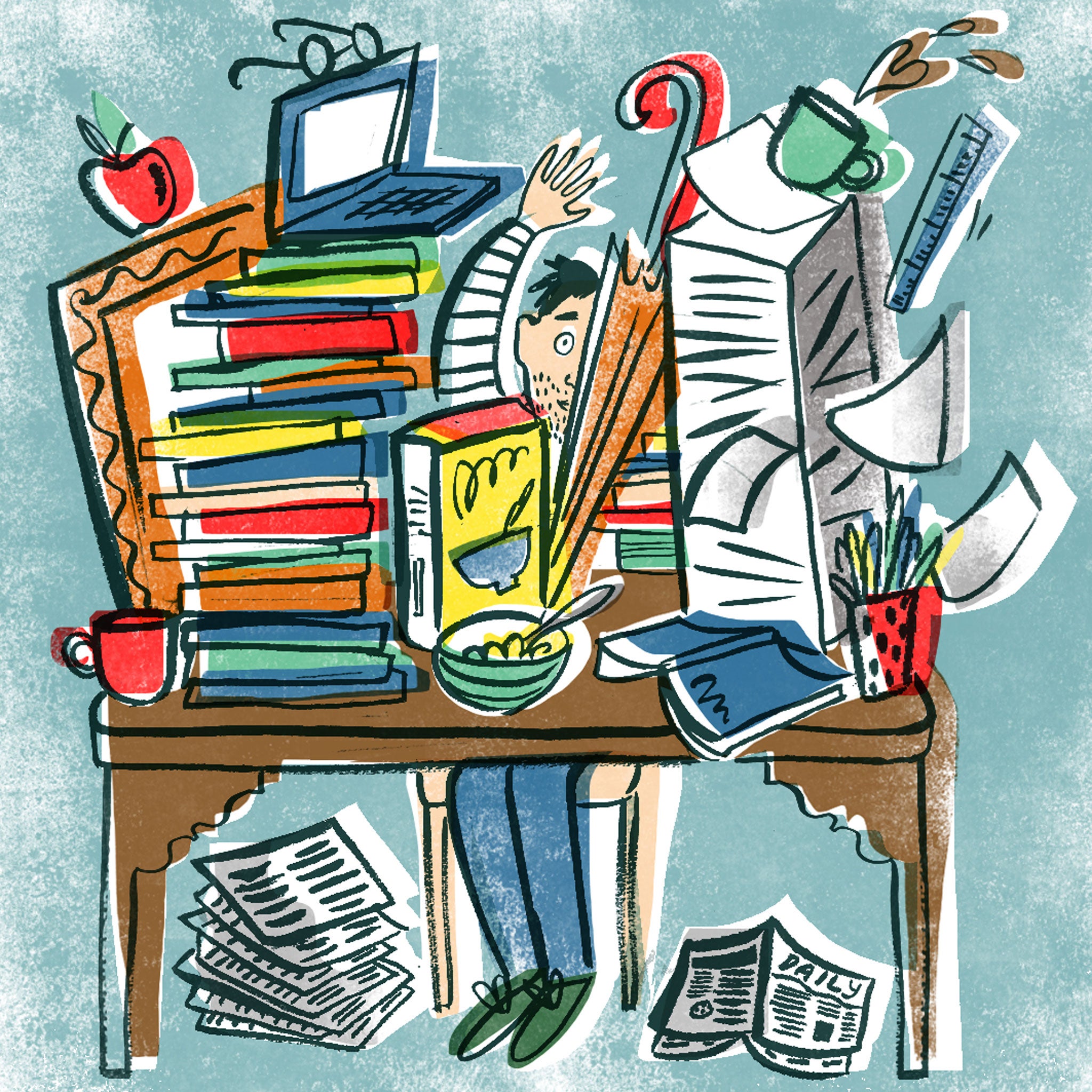
The messy desker: Joshua Neicho
I have a triumphantly messy desk. I have everything around me, my precious things, my beloved nest. What is on it? Overwhelmingly newspapers and notes; then shattered Biros, cough medicine, razor blades, at worst a ripening banana – a mess, but innocuous.
At a previous location within the office I put up a few postcards and a picture of Björk; the current configuration doesn't allow for such self-expression.
The clutter itself is my décor, my timeless Victoriana. I have been known to nap beneath my desk late at night – it's comforting, like bedding down on autumn leaves.
Like many messy folk, I have a "filing system" based on visual memory/hunch. Have I found crucial information by ferreting around my paper empire? Yes! Have I wasted hours searching through piles for something that wasn't there? Yes again – though the reassurance I get knowing there are piles to go through is golden.
I am a clean and sweet-smelling person; I am relatively good, I hope, when it comes to washing up, taking the rubbish out and scrubbing the kitchen floor in my exhaustingly social flatshare. When it comes to my immediate working environment, however, there are different rules.
I am not complacent. When it's too crowded to move my mouse, I make efforts to clean up – which tend to start with an energetic blitz and end with reassigning papers to new piles. (The space beneath my desk is clear for the first time in a year: a revelation.) In an ideal world I'd have a tidy desk – but only after securing Middle East peace.
I'm blessed with tolerant colleagues in our open-plan office. Only when outsiders visit am I conscious what a bomb site it is. But a company that isn't customer-facing that has a clean-desk policy strikes me as myopic, particularly if their business is print, or anything important. Who are they trying to impress?
There's a serious point. How many times have colleagues asked me for a copy of a paper, "because you'd have one"? We're corporeal creatures, and our frame of reference remains physical. Digital systems are fallible and binary: a filing error might put information out of reach forever. Web content changes without trace; yes, there are ways of looking back to how online pages read before they were altered, and physical files can also be falsified – but there's a difference of degree.
Computers are amazing; yet to rely totally on them and scorn laborious analogue storage methods seems utter hubris.
Clean-desk zealots are rewriters of history, beckoning down the memory hole. I will fight – not for my messy desk, but for my right to have one – and anyone who demands I tidy up, sorry, but we can't be friends.
The spendthrift: Rhiannon Harries
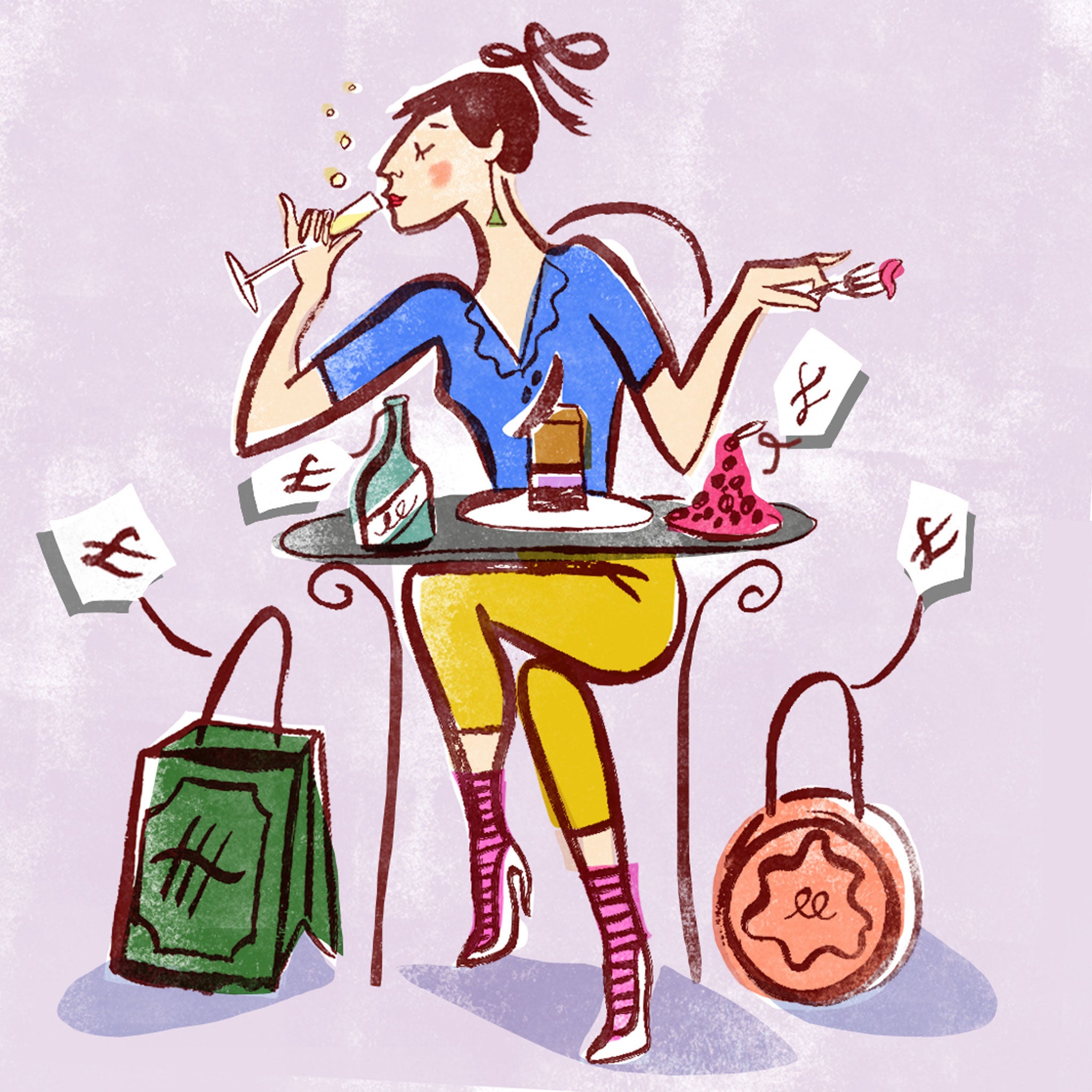
January is the cruellest month, financially speaking. That pay cheque you get early because of Christmas (24 December: "These luxury crackers are a bargain!"; 26 December: "Did I really spend £20 on luxury bloody crackers?") means a good five weeks of ekeing out your already-depleted bank balance. Imagine living like that all year round! Well, folks, I do.
I don't need an official public holiday and collective brainpower of a million ad execs to entice me to run my finances into the ground; I do it every month, more or less.
The cycle is always the same: live like a Russian oligarch the first week or so, like a minor Royal the next and, for the final 10 days, like Del Boy, swerving my creditors and desperately flogging everything of value I own. Thank heavens for eBay.
Let's get a couple of things straight, though. Being a spendthrift does not mean being in serious debt. Or it shouldn't – know thyself, people! It's why I refuse to have any credit cards; that way madness and county court judgments surely lie.
Nor does being a spendthrift equal shallow materialism. In my youth, I was guilty of chasing every magical item that was going to transform my life, but nowadays I'm more likely to spend on things to do over material goods – eating and drinking with friends, tickets for films and concerts, travel, a taxi home when it's cold and I'm knackered. These are, I'm aware, no less luxurious than a new handbag, but I wouldn't call them frivolous.
The reality of being a spendthrift, however, is that I have saved a total of zero pounds in my working lifetime. I feel a tiny bit sick when I think about home-owning peers. But to get near a deposit for a house on a fairly modest single income, I would've had to scrimp my way through my twenties and I'd still be scrimping now. Would a pokey one-bed be worth that? Not for me.
Sticking rigorously to a budget is satisfying for some (weirdos!); for those with the most meagre of resources, it's a miserable necessity. I'm fortunate that my pay covers the essentials and leaves a little more besides, but the idea of constantly totting up whether I can stretch to the three-ply or the coffee over which I'll catch up with a friend fills me with dread. I don't want to calculate my life away.
Far better to say to hell with it and flash your (debit) card for half the month, even if it makes the second half grim. In a way, it makes it Christmas every month.
The Facebook addict: Emma Townshend
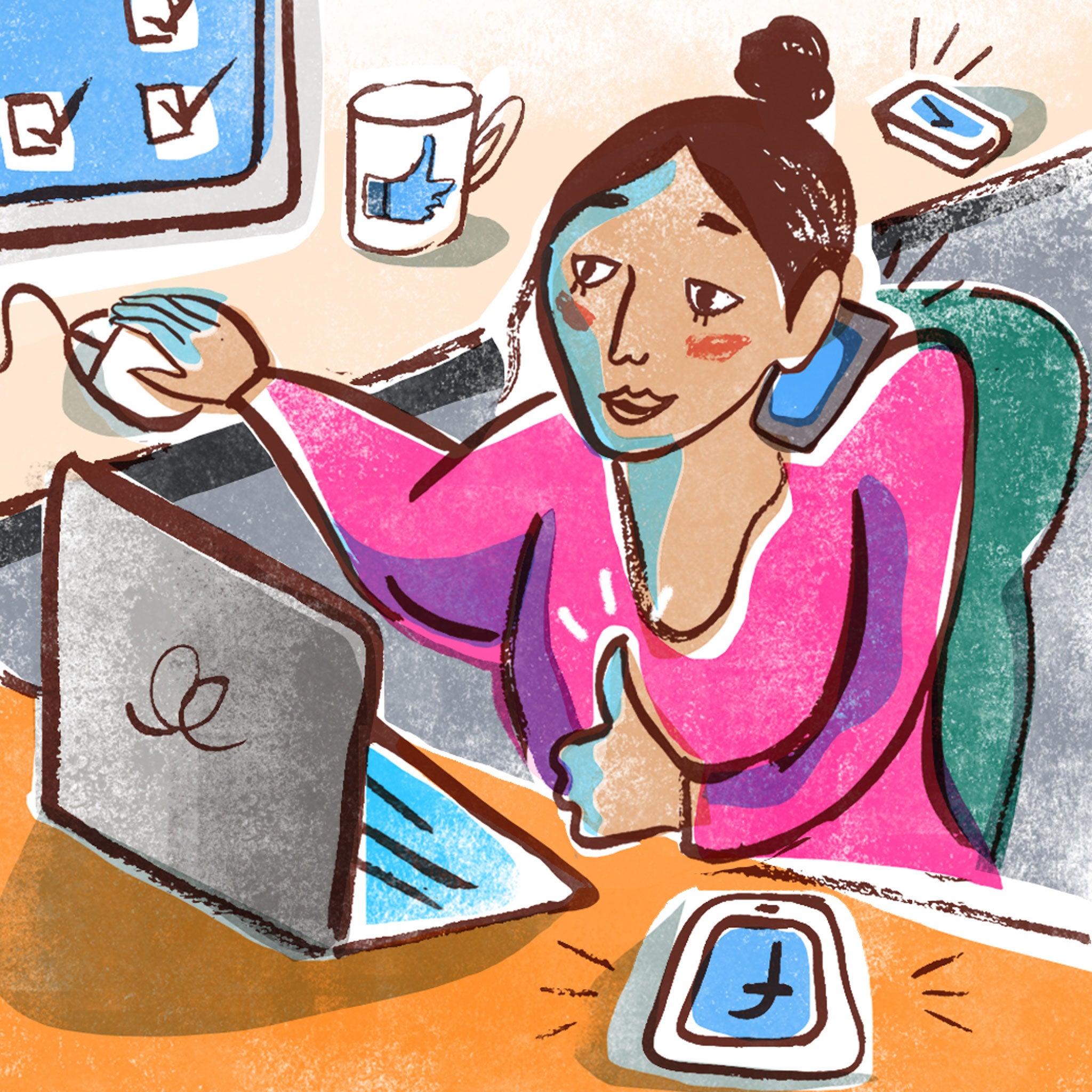
Social media make some people jittery; they make them say things like, "I prefer real life," as if you're not Really Alive while you're online. They also make even loyal users turn oddly privacy-conscious, slapping legal proclamations on their news feeds with the zeal of newly qualified process servers: "I declare, in accordance with Article 8 of the European Convention on Human Rights, that my photos, videos and posts belong to me, and by posting this, assert they should be for private use only."
Me, on the other hand, I'm yelling: "Zuckerberg, take it all! Then have a bit more!" I slap up photos with impunity; I try to police my privacy settings, but regularly notice that Mark Z's had a fiddle with them and I'm back to letting it all hang out in public. I vaguely consider the possibility of my descendants one day trawling through my lifetime of inanities, but reassure myself that they'll be too interesting to bother.
It is possible, I'll concede, that I now have some furious form of Stockholm Syndrome. Because I like Facebook. OK, I'm not crazy for its poor sense of design, unattractive blueness, and odd, unsignalled changes of character. But I've had boyfriends who've had all of those qualities and it was still love.
It's pretty easy to blame a lack of productivity on social media. Many workplaces ban it; friends with tough bosses have to post updates about those bosses from their phones in the toilets. You know what I say to tough bosses? Guess what? In the olden days, people used to spend ages on the phone to friends. Before that, they stared out of the window. Your employees have always been finding ways to piss away your time.
I feel strongly about Facebook. There are babies I've only known about because of it; there are old friends I've found again and treasured thanks to it. And it makes my day, every day: at dawn, I'll touch base with the four or five people I love who happen to live in California, just as they are going to bed. They're all snuggly, posting pictures of their evening out at the basketball, or an afternoon at the pumpkin patch; here it's dark and grimy – and they lift my heart.
Every morning from my desk at home I connect with commuters sitting on a shitty delayed train, and we make each other laugh. We make plans to see each other in real life; I've been invited to weddings, parties, book launches, and funerals because I've connected with people on Facebook.
I've proofread dissertations, book chapters and eulogies, all as a result of social media. I see exam results, nativity play outfits, and 12-week scans.
I'm not wasting my life on social media, I'm passing my life there, very happily.
The hoarder: Lisa Markwell
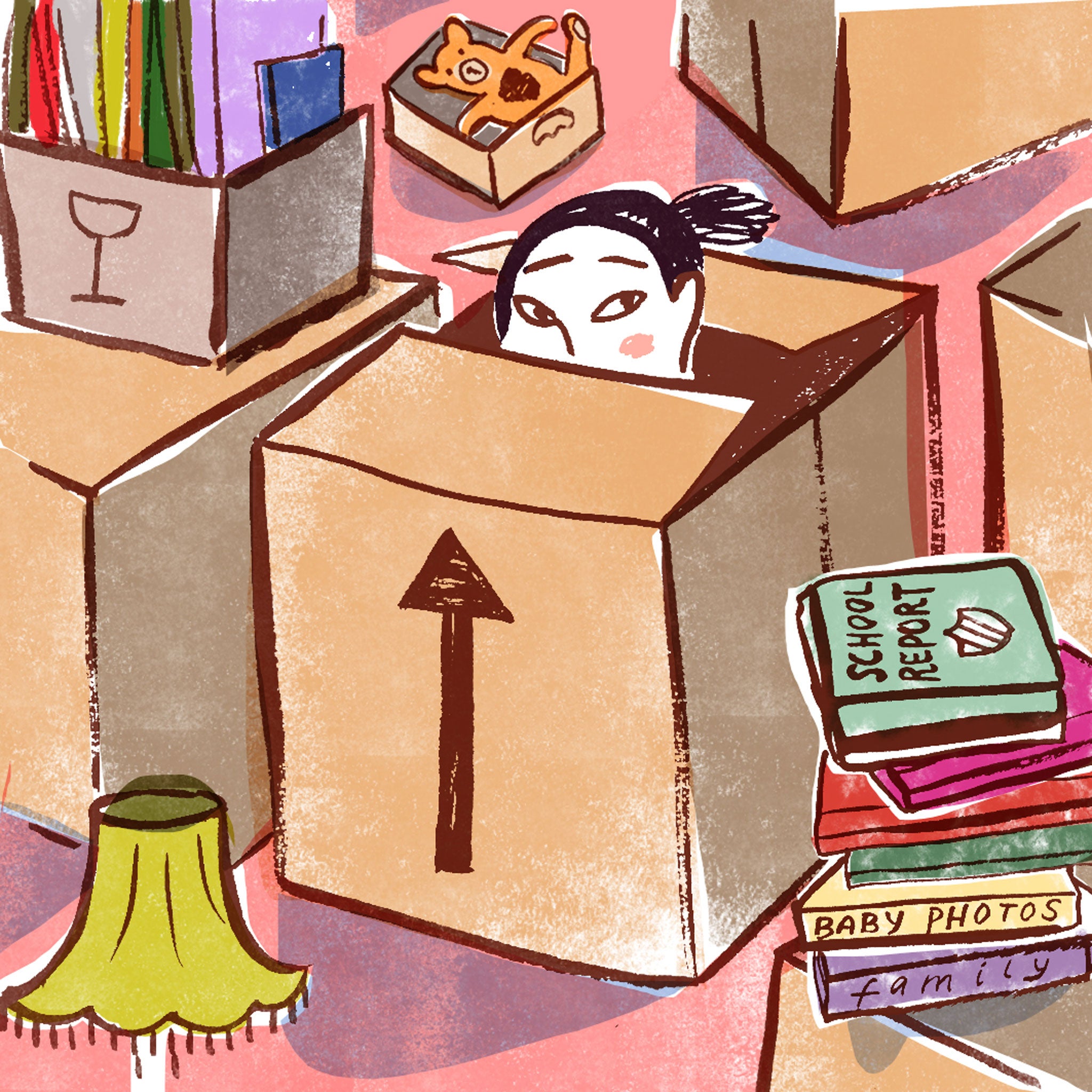
Like Mrs Sprat and her husband (yes, I'm a feminist, want to make something of it?), I am very different indeed to the fellow with whom I have spent the past 23 years. But although we are in harmony on everything from holiday destinations to breed of dog to literature, he abhors hoarding and I adore it.
I say hoarding because that's how he sees it; I consider the careful stowing away of essential objects nothing less than my duty.
What's your definition of essential? Here's where we might disagree. Bank statements from eight years ago? You never know when HMRC might fancy combing through your finances. The son's birth certificate? I bet I'm not alone in having two copies. All the correspondence pertaining to a serious illness six years ago? Call it an insurance policy against ever needing it. These are unarguable (sort of).
But then there's your daughter's milk teeth. These items, no bigger than a grain of risotto rice, are unequivocally essential. They're in a box, with a lock of white-blonde hair from when she was a tousle-headed four-year-old. When I come across them, I feel weepy about those long-ago days. When I pass them on to her, she'll do the same, I feel sure.
I was told by Lesley Garner, the wise writer on matters psychological, that storing up memorabilia with the idea that one's children will thank you later is nonsense. All you are leaving them is a giant mess in the attic.
But I can't help myself. How could they not want to read my old school reports and snigger as they compare them with their own? That early iPod might be worth a fortune one day… Those holiday diaries I forced them to write are already paying off – they adore poring over them and wondering at their "childish" writing. And a photograph of my glass bluebottle (from when I collected glass animals as a kid) got lots of likes on Instagram…
My husband, I'm sure, throws away as much of this stuff as he dares while I'm out at work. I know the elephant made out of a milk carton and cotton wool has gone missing. But even he concedes that my mum's hoarded brass rubbings from the 1970s (she's who I got this from, natch) are rather fab. And now they look amazing framed on our staircase.
So I win. And now the rest of it – letters to Santa, Sony Walkman, old Cash's nametapes – is in a store room, with a padlocked door to which only I have the key.
The party animal: Samuel Muston

To write a defence of socialising seems to verge on the absurd; it's like writing a defence of smiling. I won't, in fact, even concede that it is a bad habit. It comes down to this: there are only so many hours in a day and so many days in a life, so it pays to make them as agreeable as possible, for they pass by as quickly as clouds. And if you happen to like the company of your fellow man and woman, this is a rather cheap way of doing it.
Some will accuse you of dissolution, of burning candles at both ends – but it is they who will buy a leather jacket and motorbike when they reach 40 or 50, as you sail off into your twilight years, contented and calm, knowing that you went to bed with who you wanted, laughed when you fancied and hopefully walked the line between sociability and being perennially "tired and emotional".
That really is the trick to socialising, if trick is the right word: keep the boozing to a tolerable level. Because it is that, rather than the late nights, that wear you down. Drink too much, by all means, but don't drink too much every night.
And don't conflate networking (an American invention practised by dubious people in crap suits) with making friends. One is about money, commerce and status, the other about doubling over with laughter and borrowing each other's toothbrushes at festivals. Having spent the first week of December at a big art fair, Art Basel in Miami Beach (ABMB), I can tell you that it is an important distinction.
ABMB is nominally about art: specifically the sale of loads of art to well-upholstered millionaires. You might think it's just a big seaside networking frenzy, and you wouldn't be wholly wrong. But it is more than that. It is one large party poured out into hundreds of lunches, dinners, parties and after-parties.
From the Sunday to the Friday afternoon, every meal was accounted for, and every night led somewhere other than to bed. I ate more banquet food than I thought possible, drank about six million Martinis and learnt an invaluable lesson: the best parties, the ones I staggered from, reaching for a stable surface at 4am ( I am looking at you, W magazine), were the ones at which people were too drunk, too silly, too fundamentally sociable to network. The week nearly finished me off. Still, I left with some new pals and a dozen funny stories. Maybe the candle went up in smoke, but I had a hell of a lot of fun.
The email refusenik: Mike Higgins
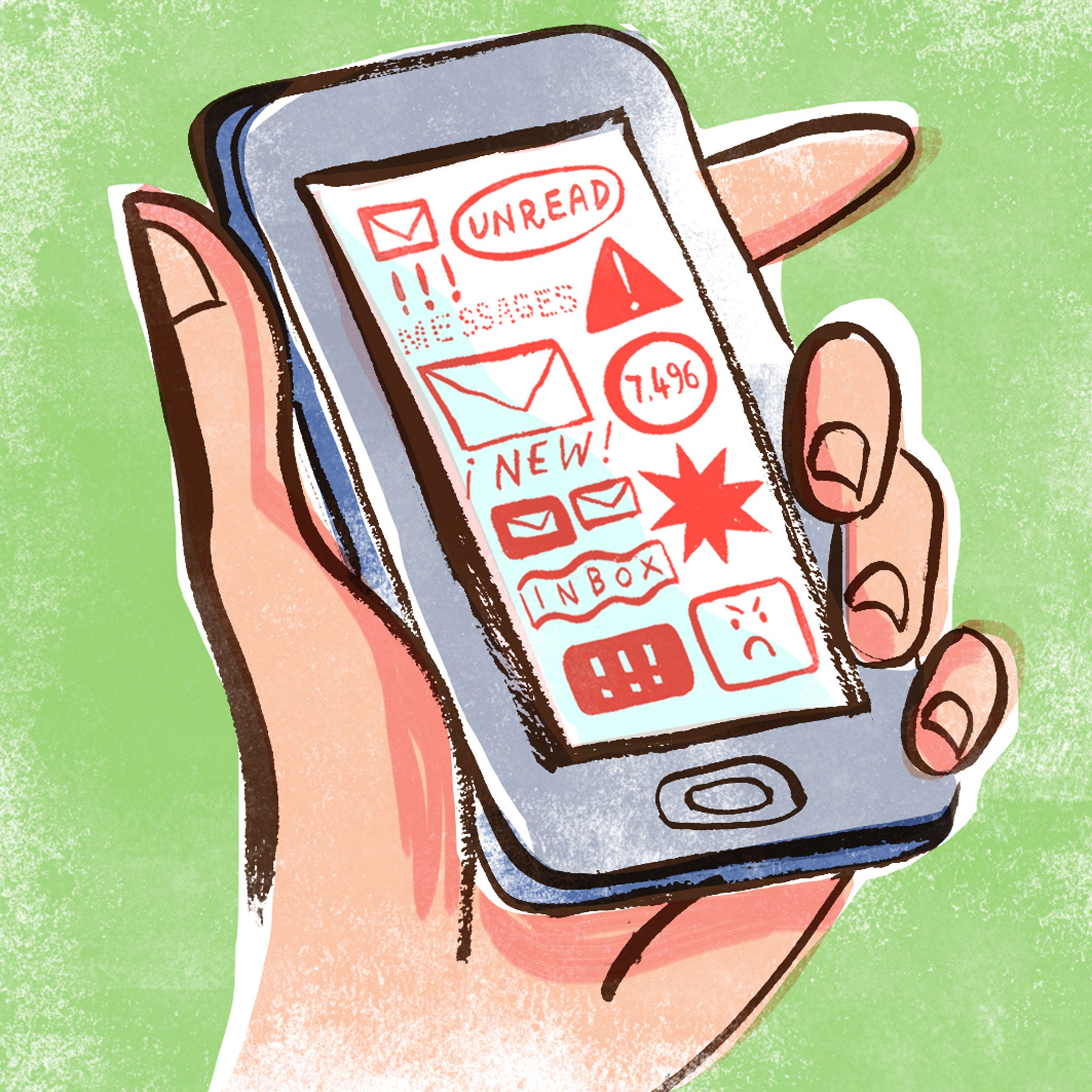
It was when the figure went north of 30,000 that I initiated my annual email cull. Thirty thousand unread emails, that is. Into the trash went every mail that had arrived more than six months earlier. Decisive, but blunt and, I admit, arbitrary – why not three months ago? Last week? Before lunch? Ineffective, too – the cull was a week or two ago and as I write, the unopened count is currently at 18,914 and rising…
I have colleagues – so do you – who operate a zero-inbox policy. A couple of years ago, one of mine showed me her empty inbox – it looked… broken. I tried zero-inbox soon after. Everything that came in got looked at and either deleted or filed in a folder optimistically called "Action!" The (real) post piled up. Phone calls went unanswered. Proofs went unread. Articles went unwritten. But I had a lovely red "0", like a halo, hovering over my email inbox. It was amazing. It lasted less than a week.
Do you know how many emails I get each day? About 350, that's how many. (Actually, I just counted properly. It's about 120, but I'm hanging on to my sense of personal embattlement if you don't mind.) And correspondents assume that because they've mailed it, I've read it. I know because I make the same mistake time and again. This is, after all, the age of that blight, the instant email alert on your computer or smartphone.
(Actually, I should admit to some related offences while I'm about it – good luck to anyone leaving me a voicemail; I'm practically phobic about those.)
So what am I doing when I'm ignoring your email(s)? The boring bits of work, sometimes; but more productively. I'm talking to people, either on the phone, or, preferably, in person, to their faces with words out of my mouth into their actual ears and back again. (This is sounding ominously like the jabberings of that crank down the pub…)
Of the very few half-decent ideas I stumble upon, the best invariably come in conversation. Nuance, humour, half-formed mind-doodles, what-ifs, how-abouts, wouldn't-it-be-ace – all that chatty stuff that gets murdered in a hastily written and even more hastily read email.
I might even argue that it's good to keep all those unread emails clogging up my inbox, you know, just in case. In case of what? Er… But I don't really think that. I know they're just clutter. There are other issues here, too. A dislike of decision-making that my email inbox puts a spiralling figure on, for one. But thankfully, the 400 words here aren't quite enough for that can of worms.
I promise that I will get around to your email, eventually (with a late-reply apology as standard). Until then… ping!
All illustrations by Sarah Tanat Jones
Join our commenting forum
Join thought-provoking conversations, follow other Independent readers and see their replies
Comments